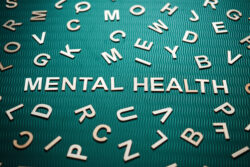Identifying Your Major Depressive Disorder Symptoms

Everyone experiences bouts of sadness, especially in response to tragedy, loneliness, stress, disappointment and the like. Experiencing sorrow in response to life’s difficult events is normal, and even confirmation that your reactions to life are normal.
For some people, though, sadness seems to linger or has unpredictable causes. If you’ve been experiencing persistent sadness that doesn’t seem to subside or causes excessive disruption to your normal life, you may be facing major depressive disorder.
Major depressive disorder
Major depressive disorder (MDD), sometimes simply called depression or clinical depression, is a mood disorder characterized by a persistent feeling of sadness and decreased pleasure in activities that used to be enjoyable.
Any person can be impacted by major depressive disorder, although people often try to discern a cause of this condition. You may know someone who struggles with depression and is unable to determine a cause, but it’s important to know that depression, like many other mental health and medical conditions, has a variety of causes and risk factors, including the following.
- Biological factors that are present from birth or impacted by the environment
- The functioning of hormones and brain chemicals
- Genetics
- Traumatic or stressful events
- Alcohol or drug addictions
- Serious illness or chronic pain
- Certain medications that impact mood
There are generally multiple factors that contribute to major depressive disorder. Rarely are all of the origins of depression observable.
Major depressive disorder symptoms
Clinical depression is diagnosed using the American Psychological Association’s Diagnostic and Statistical Manual of Mental Disorders Fifth Edition, or DSM V.
Only a trained mental health practitioner or doctor can make an official diagnosis, but understanding major depressive disorder symptoms can give you insight into your own behaviors and whether your feelings of sadness require professional treatment.
In order for a person to meet major depressive disorder criteria in the DSM V, he or she must experience lack of enjoyment in addition to five or more of the following depressive symptoms.
- Experiencing a depressed mood for most of the day on a majority of the days
- Significant weight changes (weight loss or weight gain or changes in appetite)
- Trouble falling asleep and staying asleep (insomnia) or oversleeping (hypersomnia)
- Psychomotor agitation (restlessness and anxiety that causes repetitive, unintentional movements)
- Fatigue or low energy
- Feelings of worthlessness, hopelessness or guilt
- Difficulty concentrating and remembering things
- Thoughts of death, self-harm or suicide
If someone you know poses a danger to himself or another person, don’t hesitate to call for help. Reach out by calling 911 or the Suicide and Crisis Lifeline by dialing 988.
The above major depressive disorder symptoms, in order to meet the requirements for a diagnosis, must cause impairment in normal life (such as completing school or work tasks).
The above changes in behavior also cannot be attributed to medication or substance use. A clinician must additionally rule out any other potential mental health or medical condition as the cause of the behaviors.
According to major depressive disorder criteria defined in the DSM V, depressive symptoms must be present for two weeks consecutively, although many people suffer with depression much longer before seeking out treatment.
If you are experiencing some major depressive disorder symptoms that are sporadic or less intense, but continue over a long period of time, you may be facing bipolar disorder or cyclothymic disorder. It’s best to consult with a therapist or doctor if you’re unsure about the symptoms you’re facing.
Major depressive disorder treatment
Clinical depression can cause unbearable distress in someone’s life, but the good news is that depression can be treated and symptoms successfully managed. The sooner treatment begins, the sooner a person can benefit from therapy, medication and lifestyle changes.
The first line of defense in treating MDD or any mood disorder is through therapy. There are dozens of potential therapeutic techniques, but talk-therapy (sometimes called psychotherapy by mental health professionals) is the most evidence-based method of treating depression.
Talk-therapy is what most people picture when they think of therapy. Therapy can also include complementary methods like nature therapy, mindfulness meditation or electroconvulsive therapy.
Medication has also proven to be effective in reducing symptoms in those with MDD. The drugs most commonly prescribed as part of a major depressive disorder treatment plan include antidepressants such as selective serotonin reuptake inhibitors, serotonin norepinephrine reuptake inhibitors and tricyclic antidepressants.
A wide variety of lifestyle changes may be recommended in order to minimize major depressive disorder symptoms and heal the root of the disorder, too. A doctor may recommend dietary changes to balance hormones. An exercise regimen can assist with decreasing feelings of fatigue and restoring normal sleep patterns.
Moreover, a person may need to simultaneously attend treatment for a substance use disorder, find housing away from dysfunctional individuals, leave a dangerous relationship or decrease stress by seeking a greater work-life balance.
Whatever goals are designed in collaboration between you and your therapist will be chronicled in a treatment plan. Your treatment plan for MDD will indicate action steps laid out through clear and measurable objectives. The treatment plan will work as a guide and assessment tool to determine whether your symptoms improve and next steps for treatment.
Treating major depressive disorder with Pyramid Healthcare
At Pyramid Healthcare you can find the care you need for depression and other mental health conditions, including substance use disorders. Reclaim your health and wellbeing at our new Ohio facility.
Everyone experiences bouts of sadness, especially in response to tragedy, loneliness, stress, disappointment and the like. Experiencing sorrow in response to life’s difficult events is normal, and even confirmation that your reactions to life are normal.
For some people, though, sadness seems to linger or has unpredictable causes. If you’ve been experiencing persistent sadness that doesn’t seem to subside or causes excessive disruption to your normal life, you may be facing major depressive disorder.
Major depressive disorder
Major depressive disorder (MDD), sometimes simply called depression or clinical depression, is a mood disorder characterized by a persistent feeling of sadness and decreased pleasure in activities that used to be enjoyable.
Any person can be impacted by major depressive disorder, although people often try to discern a cause of this condition. You may know someone who struggles with depression and is unable to determine a cause, but it’s important to know that depression, like many other mental health and medical conditions, has a variety of causes and risk factors, including the following.
- Biological factors that are present from birth or impacted by the environment
- The functioning of hormones and brain chemicals
- Genetics
- Traumatic or stressful events
- Alcohol or drug addictions
- Serious illness or chronic pain
- Certain medications that impact mood
There are generally multiple factors that contribute to major depressive disorder. Rarely are all of the origins of depression observable.
Major depressive disorder symptoms
Clinical depression is diagnosed using the American Psychological Association’s Diagnostic and Statistical Manual of Mental Disorders Fifth Edition, or DSM V.
Only a trained mental health practitioner or doctor can make an official diagnosis, but understanding major depressive disorder symptoms can give you insight into your own behaviors and whether your feelings of sadness require professional treatment.
In order for a person to meet major depressive disorder criteria in the DSM V, he or she must experience lack of enjoyment in addition to five or more of the following depressive symptoms.
- Experiencing a depressed mood for most of the day on a majority of the days
- Significant weight changes (weight loss or weight gain or changes in appetite)
- Trouble falling asleep and staying asleep (insomnia) or oversleeping (hypersomnia)
- Psychomotor agitation (restlessness and anxiety that causes repetitive, unintentional movements)
- Fatigue or low energy
- Feelings of worthlessness, hopelessness or guilt
- Difficulty concentrating and remembering things
- Thoughts of death, self-harm or suicide
If someone you know poses a danger to himself or another person, don’t hesitate to call for help. Reach out by calling 911 or the Suicide and Crisis Lifeline by dialing 988.
The above major depressive disorder symptoms, in order to meet the requirements for a diagnosis, must cause impairment in normal life (such as completing school or work tasks).
The above changes in behavior also cannot be attributed to medication or substance use. A clinician must additionally rule out any other potential mental health or medical condition as the cause of the behaviors.
According to major depressive disorder criteria defined in the DSM V, depressive symptoms must be present for two weeks consecutively, although many people suffer with depression much longer before seeking out treatment.
If you are experiencing some major depressive disorder symptoms that are sporadic or less intense, but continue over a long period of time, you may be facing bipolar disorder or cyclothymic disorder. It’s best to consult with a therapist or doctor if you’re unsure about the symptoms you’re facing.
Major depressive disorder treatment
Clinical depression can cause unbearable distress in someone’s life, but the good news is that depression can be treated and symptoms successfully managed. The sooner treatment begins, the sooner a person can benefit from therapy, medication and lifestyle changes.
The first line of defense in treating MDD or any mood disorder is through therapy. There are dozens of potential therapeutic techniques, but talk-therapy (sometimes called psychotherapy by mental health professionals) is the most evidence-based method of treating depression.
Talk-therapy is what most people picture when they think of therapy. Therapy can also include complementary methods like nature therapy, mindfulness meditation or electroconvulsive therapy.
Medication has also proven to be effective in reducing symptoms in those with MDD. The drugs most commonly prescribed as part of a major depressive disorder treatment plan include antidepressants such as selective serotonin reuptake inhibitors, serotonin norepinephrine reuptake inhibitors and tricyclic antidepressants.
A wide variety of lifestyle changes may be recommended in order to minimize major depressive disorder symptoms and heal the root of the disorder, too. A doctor may recommend dietary changes to balance hormones. An exercise regimen can assist with decreasing feelings of fatigue and restoring normal sleep patterns.
Moreover, a person may need to simultaneously attend treatment for a substance use disorder, find housing away from dysfunctional individuals, leave a dangerous relationship or decrease stress by seeking a greater work-life balance.
Whatever goals are designed in collaboration between you and your therapist will be chronicled in a treatment plan. Your treatment plan for MDD will indicate action steps laid out through clear and measurable objectives. The treatment plan will work as a guide and assessment tool to determine whether your symptoms improve and next steps for treatment.
Treating major depressive disorder with Pyramid Healthcare
At Pyramid Healthcare you can find the care you need for depression and other mental health conditions, including substance use disorders. Reclaim your health and wellbeing at our new Ohio facility.







